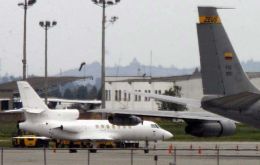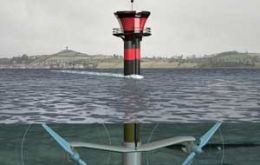MercoPress. South Atlantic News Agency
Stories for April 2008
-
Thursday, April 10th 2008 - 21:00 UTC
UK cuts rate 0.25%; expects inflation to fall back in mid term

The Bank of England on Thursday lowered interest rates to 5% from 5.25% in an attempt to spur the UK economy. This is the third rate cut since early December.
BoE argued that concern over the slowing down of the economy was more immediate that inflation, which should fall back to 2% in the mid term. -
Thursday, April 10th 2008 - 21:00 UTC
Targeting short-term inflation ECB leaves Euro rates on hold

The European Central Bank left interest rates on hold at 4% highlighting concern about accelerating short-term inflation pressures and the acknowledgement of a protracted period of economic uncertainty stemming from the global credit crisis.
-
Thursday, April 10th 2008 - 21:00 UTC
Yuan up 4.3% against US dollar in 2008; 18.3% since Jul 05

The Chinese currency broke this week the psychological benchmark of seven Yuan to the US dollar which could signal a change of policy in Beijing since a stronger currency should help fight inflation and makes food and energy prices cheaper.
-
Thursday, April 10th 2008 - 21:00 UTC
Brazilian companies doubled profits under Pte. Lula da Silva

Brazilian corporations from 21 different business sectors doubled their profits in the five years of President Lula da Silva administrations (2003/2007), according to information disclosed by Economatica consultants in Sao Paulo.
-
Thursday, April 10th 2008 - 21:00 UTC
World Bank warns about rising food prices and poverty
World Bank President Robert Zoellick called Thursday for a “New Deal” on global food policy to address hunger and emergency situations in developing countries such as Haiti because of rising food prices.
-
Wednesday, April 9th 2008 - 21:00 UTC
French hostage mission to leave Colombia

France called off a humanitarian mission Tuesday to treat and possibly free ailing hostage Ingrid Betancourt after Colombian rebels said they wouldn't unilaterally release any more captives.
-
Wednesday, April 9th 2008 - 21:00 UTC
Japanese Girl, 11, to cycle across South America

An 11-year-old girl from Saitama Prefecture is due to set off on a seven-month journey by bicycle across South America with her parents.
-
Wednesday, April 9th 2008 - 21:00 UTC
Safety: American Airlines cancels 500 flights

American Airlines expects to cancel more flights on Wednesday after cancelling about 500 on Tuesday.
-
Wednesday, April 9th 2008 - 21:00 UTC
Falklands: RM veteran 'test case' for special flights

BRYAN SIBLEY, a Corporal in the Royal Marines during the Falklands War, has become the first SAMA82 veteran to be awarded an indulgence flight to visit the Islands.
-
Wednesday, April 9th 2008 - 21:00 UTC
Chile and England have the highest wave energy potential

Chile is the country with the highest wave energy potential in the world, the British engineering consultant Baird & Associates reported last week. According to company officials, wave energy along Chile's coast can satisfy up to 24% of the country's energy demand in summer and 26% in winter.
